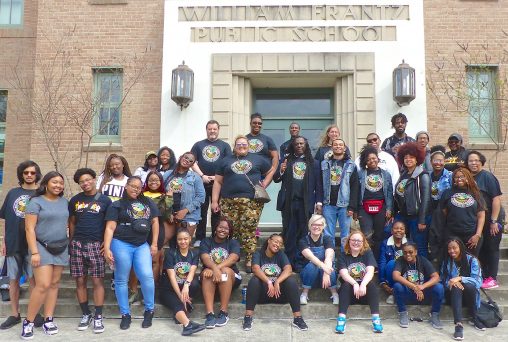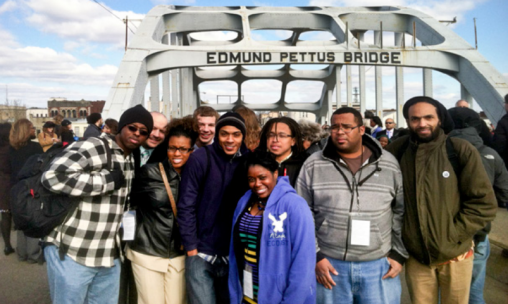
During the civil rights pilgrimage in 2019, Wright State students visited William Frantz Public School in New Orleans, where in 1960 Ruby Bridges became the first African American child to desegregate the school. Students on this spring’s trip will visit locations of critical events in the civil rights struggle in Ohio.
A Wright State University professor is taking his class on the road to drive home the history of the civil rights movement in Ohio.
Tracy Snipe, Ph.D., a professor of political science in the School of Social Sciences and International Studies, is organizing the March 31 to April 1 trip to complement a class with the theme “The roots of the American civil rights movement in the Midwest and heartland.”
“This is part of the classroom experience,” Snipe said. “It’s a way to put that class into action. The emphasis of the civil rights movement is (often) placed exclusively on the South. On this pilgrimage, we’ll look at hidden connections… The purpose is to (illustrate) how Ohio can be thought of as having critical events in the civil rights struggle.”
Assisting Snipe on the trip are John Feldmeier, Ph.D., professor of political science, and Kim Collins, assistant director of the Bolinga Black Cultural Resources Center.
Snipe expects about 25 people, maybe more, on the bus trip, which will leave from Wright State around 7:30 a.m. on Friday, March 31. Most of those attending will be college students, but the delegation may include faculty, staff and residents from the greater Dayton community. The group will return to Wright State on Saturday evening, April 1. Participants may also select a one-day option on March 31.
Information about registering for the pilgrimage is available at wright.edu/event/roots-of-the-american-civil-rights-movement-in-the-midwest-or-heartland-ohio.
The first stop on March 31 will be at the National Afro-American Museum and Cultural Center in Wilberforce.
Blondelle Gadsden, a relative of one of the nine people in a prayer group fatally shot at Mother Emanuel AME Church in Charleston, South Carolina, in June 2015, will provide the opening address. Snipe said this is particularly moving because he is a Charleston native.
The second stop will be at Miami University in Oxford, the site of the former Western College for Women. This stop has particular historical significance, Snipe said.
In 1964, volunteers for the civil rights initiative known as Freedom Summer trained at the Western College for Women. College students from across the country were recruited by the Student Nonviolent Coordinating Committee, Congress of Racial Equality and other organizations to teach in Freedom Schools, build community centers and register African Americans to vote in Mississippi. Approximately 800 students trained at Western, three of whom were murdered for their activism.
The third stop on March 31 will be at the National Underground Railroad Freedom Center in Cincinnati.
“This is an example of America’s first civil rights movement,” Snipe said. “People of different races got together to promote a cause.”

Wright State students on the Edmund Pettus Bridge in Selma, Alabama, during the 2013 Congressional Civil Rights Pilgrimage to Alabama.
Addressing those on the pilgrimage at the museum will be State Rep. Willis E. Blackshear Jr., a Wright State graduate from Dayton. As a student, Blackshear participated in the last such pilgrimage, in 2019, which visited civil rights sites in the South.
“This shows a connection between a student who took the class and who rose to a whole other level as a legislator,” Snipe said.
Two Wright State graduates will address the group: Rebekkah Mulholland, Ph.D., assistant professor of history at California State University Sacramento, and Chad Lovins, philanthropy officer of Big Brothers and Big Sisters of the Miami Valley. Additional speakers include Delbert DuBois and alumnae Kayelin Tiggs.
Participants also travel to Cleveland to visit the historic East Cleveland Public Library to meet Samaria Rice, the mother of Tamir Rice, a 14-year-old boy who was fatally shot on Nov. 22, 2014, by Cleveland police who mistook his toy gun for a real one.
Snipe said students often focus on past civil rights struggles but need to be reminded of contemporary issues.
The group will also visit Lorain, Ohio, the birthplace of prizewinning writer Toni Morrison, and stops along Cleveland’s civil rights trail, including a church where the Rev. Dr. Martin Luther King Jr. and Malcolm X spoke.
The final stop will be at the Rock & Roll Hall of Fame, which has exhibits about King and Black musicians. The bus then will return to Wright State.
Snipe said this year marks 60 years since the civil rights events of 1963, which included King’s “I Have a Dream” speech, the fatal shooting of civil rights figure Medgar Evers and the assassination of President John Kennedy.
Also, in 1963 was the bombing of the 16th Street Church in Birmingham, Alabama, that killed four Black girls.
Snipe wrote a book about one of the survivors, “The 5th Little Girl: Soul Survivor of the 16th Street Baptist Church Bombing (The Sarah Collins Rudolph Story).” He is now writing “Saving the Best Wine for Last,” an historical memoir about bombing survivor Junie Collins Williams, who is also slated to give a virtual presentation during the 2023 pilgrimage in Ohio.
Two of the students who will be on the pilgrimage are looking forward to the experience. Quentin Wade, a senior psychology major from Cincinnati, said, “What I look forward to the most about this trip is to learn more about my culture and to be engaged in this learning activity.” He said afterward he plans to “spread the knowledge that I have learned to other people in my community.”
Ruth Yeboah, a senior social work major from Columbus, said, “What I look forward to most about this trip is to see a part of history in physical form and gain more knowledge about Black/African American history along the way. What I think my takeaway will be is by the time the trip is over, I will want to do more in my community.”
Snipe views this pilgrimage experience as “promoting diversity at Wright State and stimulating hard conversations.”
From March 18 – 25, Wright State will feature an exhibit at the Robert and Elaine Stein Galleries in 160 Creative Arts Center, “THEM: Images of Separation,” presented by the Jim Crow Museum of Racist Memorabilia at Ferris State University. According to the museum description, “‘THEM’ tackles contentious issues … such as anti-Arab sentiment, Holocaust denial, ‘don’t ask, don’t tell’ and immigration.”
Questions about the trip may be addressed by the College of Liberal Arts at liberalarts@wright.edu.


 Wright State psychology team studies ways to identify fatigue in pilots, drivers
Wright State psychology team studies ways to identify fatigue in pilots, drivers  Wright State videographer Kris Sproles wins Regional Emmy and Ohio journalism award
Wright State videographer Kris Sproles wins Regional Emmy and Ohio journalism award  Wright State Boonshoft School of Medicine ranked among the nation’s best for 2024 by U.S. News
Wright State Boonshoft School of Medicine ranked among the nation’s best for 2024 by U.S. News  Exposing biotechnology
Exposing biotechnology  Wright State faculty member Dan Noel uses unique background to inspire new leaders
Wright State faculty member Dan Noel uses unique background to inspire new leaders 